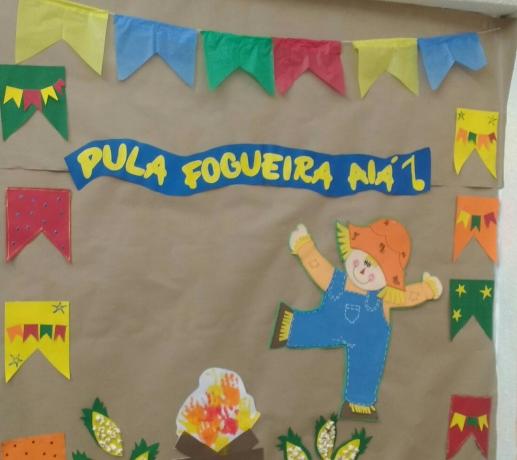
The best suggestions and templates ready for your Project Festa Junina Children's Education at School.
This festival has its origins in Catholic countries in Europe and, therefore, would be in honor of Saint John. In the beginning, the party was called Joanina.
In schools across the country, especially in early childhood education, teachers and other employees use this date to work in the classroom with students. And it was with this in mind that we selected these ideas for your Festa Junina Infant Education Project, check out:
See more at: June 2019 Party Project.
Index

SPECIFIC OBJECTIVES:
______

The main purpose of this Children's education party project for initial series is to enrich the group's knowledge of the June party customs. This will be done through playful and pleasurable activities, contributing to the socialization of students, encouraging them to enjoy parties Juninas, offering them opportunities to relax, socialize and expand their knowledge through diversified activities, games and presentations characteristic of these festivities that are part of Brazilian folklore, highlighting their popular, social and cultural.
Regardless of the teaching materials used, whether they are the most basic and traditional, such as the blackboard and the book, or the technologies more advanced, the teacher's methodological action will depend on the pedagogical political principles constructed by the teacher in the day-to-day of their experiences.
The evaluation will be through registration in relation to the individual and collective learning of the students against the activities proposed during the development of the project. Participation, collaboration and organization during the activities will be evaluated during the project. The evaluation process will be continuous, permanent and cumulative during the beginning and end of the project, observing the changes in ethical and social behavior of students, participation and involvement in the group work.
______

Cai cai Balão/ Capelinha de Melão/ The balloon goes up/ Requebradinho/ Rehearsal of our presentation at the Julina party.
Figures, cutouts, collage, in other words, all the material obtained to illustrate our mural.
My balloon/June Party
We are in the month of June and the celebrations of Festas Junina have started. What is a Junina or a Julina party?
List what you have at the June parties?
Make children aware of the danger of balloons at this time of year;
Explore the characteristics, properties and possibilities of handling different materials, getting in touch with different forms of artistic expression;
______________________
This one Children's education party project at school aims to integrate the celebration of the June party with the project that our school is already developing: Social Rescue, which seeks to exercise citizenship through concrete, solidary and participatory actions, for the benefit and improvement of life.
This project is divided into four stages: in-room activities related to the date, scavenger hunt, Festa Junina and Festa Junina Solidária. The first two steps are taking place at the same time.
Stages of development:
Teachers from all disciplines will participate in the project by developing classroom activities related to the date we are celebrating.
Portuguese: Explore the reading of informative texts, poetry, June music, formal and informal texts, as well as comics, word searches and crosswords. Put together a booklet with typical food and drinks from June.
History: Know the origin of the Juninas and Saints festivals of the month. Know the meaning of the typical dances of the June festival, such as the dance of pau-de-fitas, square dance and others.
Mathematics and Science: Know the typical Junina foods and explore them in terms of quantities, prices, cooking time, mass and fraction measurements. Do, as cooking, some of the typical foods. Create challenges involving situations from the June party, as well as the scavenger hunt we are developing.
Art: Produce posters with the sympathies, typical recipes and representations of the party. Decorate the rooms and the school.
Geography: Geographically locate the countries that started the June festivities, such as France and Portugal. Do the same on the map of Brazil, highlighting the regions and the way the June festival is celebrated in each one of them.
PE: Discover the typical dances and present them at the June party
Subscribe to our email list and receive interesting information and updates in your email inbox
Thanks for signing up.


